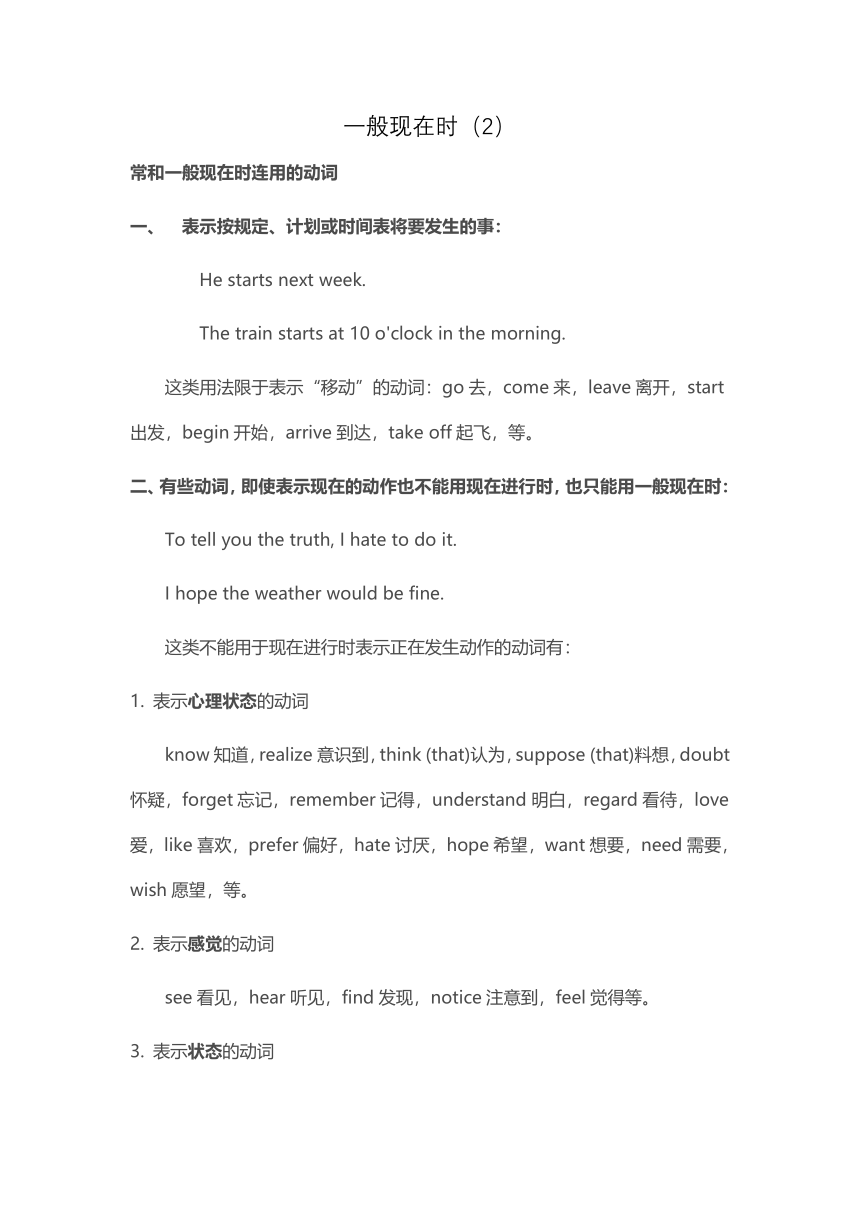
一般现在时(2) 常和一般现在时连用的动词 表示按规定、计划或时间表将要发生的事: He starts next week. The train starts at 10 o'clock in the morning. 这类用法限于表示“移动”的动词:go去,come来,leave离开,start出发,begin开始,arrive到达,take off起飞,等。 二、有些动词,即使表示现在的动作也不能用现在进行时,也只能用一般现在时: To tell you the truth, I hate to do it. I hope the weather would be fine. 这类不能用于现在进行时表示正在发生动作的动词有: 1. 表示心理状态的动词 know知道,realize意识到,think (that)认为,suppose (that)料想,doubt怀疑,forget忘记,remember记得,understand明白,regard看待,love爱,like喜欢,prefer偏好,hate讨厌,hope希望,want想要,need需要,wish愿望,等。 2. 表示感觉的动词 see看见,hear听见,find发现,notice注意到,feel觉得等。 3. 表示状态的动词 be是,have有,belong属于,own拥有,possess拥有,suit适合,fit适合,contain包含,depend依靠,smell有……的气味 ,taste有……的味道,seem显得,look显得,appear看来,turn out变成 一般现在时时态用法详解 【一般现在时代替进行时】 (1) 句型:Here comes… ; There goes… Look, here comes Mr. Li. (2) 表示即将发生的或预定中计划好的活动。 Are you staying with us this weekend 这周和我们一起度周末吗 We are leaving soon. 我们马上就走。 (3) 渐变动词,如:get, run, grow, become, begin及die。 【一般现在时代替完成时】 (1)有些动词用一般现在时代替完成时: hear, tell, learn, write , understand, forget, know, find , say, remember. I hear (= have heard) he will go to London. I forget (=have forgotten) how old he is. (2)句型 " It is … since…"代替"It has been … since …" (3)It is (= has been) five years since we last met. 【一般现在时代替过去时】 (1)"书上说","报纸上说"等。 The newspaper says that it's going to be cold tomorrow. 报纸上说明天会很冷的。 (2)叙述往事,使其生动。 Napoleon's army now advances and the great battle begins. 【一般现在时代替将来时】 (1)时间状语从句,条件句中,从句用一般现在时代替将来时 When, while, before, after, till, once, as soon as, so long as, by the time, if, in case (that), unless, even if, whether, the moment, the minute, the day, the year, immediately He is going to visit her aunt the day he arrives in Beijing. 他一到北京,就去看他姨妈。 (2)表示现在已安排好的未来事项,行程等活动。 The museum opens at ten tomorrow. 博物馆明天10点开门。(实际上每天如此。) 【一般现在时表将来】 一、“主将从现”原则,当主句为将来时态或表示将来意义时,时间和条件的状语从句必须用一般现在时表将来: I'll write to her when I have time. 我有空会给她写信。 Turn off the lights before you leave. 走前关灯。 If we hurry, we may catch the bus. 如果赶紧走我们可能赶得上公共汽车。 Tell me in case you get into difficulty. 遇到困难请告诉我。 (1)除表示时间和条件的状语从句外,表示让步、相似、比例的从句也必须用一般现在时表将来: I'll follow him wherever he goes. 他去哪儿,我就跟着去哪。 Whatever you say, I won't pay. 无论你说什么,我都不会付钱。 Whether we help him or n ... ...
~~ 您好,已阅读到文档的结尾了 ~~